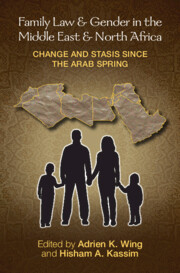Book contents
- Family Law and Gender in the Middle East and North Africa
- Family Law and Gender in the Middle East and North Africa
- Copyright page
- Contents
- Contributors
- Acknowledgments
- Introduction
- 1 Sustained Reforms
- 2 Family Law in Egypt
- 3 Women’s Rights in the Moroccan Family Code
- 4 Postponing Equality in the Algerian Family Code
- 5 Juristic and Legislative Rulemaking
- 6 The Status of Muslim Women in the Mosaic of Islamic Family Law in Lebanon
- 7 In Circles We Go
- 8 The Palestinian Minority in Israel
- 9 West Bank and Gaza Personal Status Law
- 10 Qatari Family Law, When Custom Meets Shari′a
- Glossary
- Bibliography
- Index
6 - The Status of Muslim Women in the Mosaic of Islamic Family Law in Lebanon
Published online by Cambridge University Press: 18 May 2023
- Family Law and Gender in the Middle East and North Africa
- Family Law and Gender in the Middle East and North Africa
- Copyright page
- Contents
- Contributors
- Acknowledgments
- Introduction
- 1 Sustained Reforms
- 2 Family Law in Egypt
- 3 Women’s Rights in the Moroccan Family Code
- 4 Postponing Equality in the Algerian Family Code
- 5 Juristic and Legislative Rulemaking
- 6 The Status of Muslim Women in the Mosaic of Islamic Family Law in Lebanon
- 7 In Circles We Go
- 8 The Palestinian Minority in Israel
- 9 West Bank and Gaza Personal Status Law
- 10 Qatari Family Law, When Custom Meets Shari′a
- Glossary
- Bibliography
- Index
Summary
The Lebanese family law system characterized by legal and judicial pluralism controls major aspects of a woman’s rights such as marital, child custody and social rights. While issues of personal status are exclusively left to religious courts and sectarian legislation, it is undeniable that women in Lebanon, are left at the whim of not only an entrenched religious establishment but also cultural norms of patriarchy. Historical practices of Islamic family law issues find little premise in shari’a but rather in the interpretation and implementation thereof. Thus, opening the door to activism and Islamic jurisprudential approach could bring change on religiously delicate issues. In pursuit of gender equality, efforts to reform laws and break the status quo have in certain instances proved successful, yet the transition to a secular personal status law system at the image of Lebanon’s progressive civil society, is far from being reached.
- Type
- Chapter
- Information
- Family Law and Gender in the Middle East and North AfricaChange and Stasis since the Arab Spring, pp. 113 - 126Publisher: Cambridge University PressPrint publication year: 2023
- 1
- Cited by

